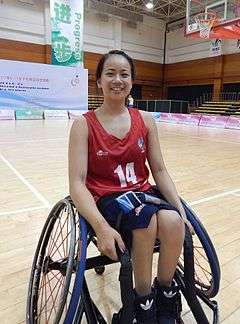Joy Haizelden
Joy Haizelden (born 1 December 1998) is a 2.5 point British wheelchair basketball player who was the youngest player to represent Great Britain at the 2014 Women's World Wheelchair Basketball Championship in Toronto.
 Joy Haizelden at the 2015 Women's U25 Wheelchair Basketball World Championship in Beijing | ||||||||||||||||||||||||||
| Personal information | ||||||||||||||||||||||||||
|---|---|---|---|---|---|---|---|---|---|---|---|---|---|---|---|---|---|---|---|---|---|---|---|---|---|---|
| Nationality | ||||||||||||||||||||||||||
| Born | 1 December 1998 | |||||||||||||||||||||||||
| Sport | ||||||||||||||||||||||||||
| Country | Great Britain | |||||||||||||||||||||||||
| Sport | Wheelchair basketball | |||||||||||||||||||||||||
| Disability class | 2.5 | |||||||||||||||||||||||||
| Event(s) | Women's team | |||||||||||||||||||||||||
| Club | Blackhawks | |||||||||||||||||||||||||
Medal record
| ||||||||||||||||||||||||||
Biography
Joy Haizelden was born on 1 December 1998.[1] Joy and her older sister Miriam, both of whom have spina bifida, were abandoned outside an orphanage in their native China. They were adopted by an English couple, Jim and Margaret Haizelden, who took them to live in Southampton, in Hampshire, in 2005. She was a student at The Kings School.[1] They could not participate in physical education, so Jim went looking for ways to keep them fit and active. A friend invited him to bring them to his wheelchair basketball club.
Haizelden is classified as a 2.5 point player. She made her international debut in the Standard Life Head to Head series against the Netherlands in 2013. This was followed by the U25 European Wheelchair Basketball Championships, where Team Great Britain won the silver medal.[1] She was named the Peter Jackson Young Female Player of the Year at The Lord’s Taverners National Junior Championships in July 2013,[2] and was part of England South’s team at the Sainsbury 2013 School Games, winning bronze.[1]
At the age of 15, she was the youngest player chosen to represent Great Britain at the 2014 Women's World Wheelchair Basketball Championship in Toronto.[1] Team Great Britain came fifth, its best ever result at the World Championship.[3] The following year, she was part of Team Great Britain at the Osaka Cup in Japan in February,[4] winning silver,[5] and at the 2015 Women's U25 Wheelchair Basketball World Championship in Beijing in July,[6] winning gold.[7] The senior team then defeated France to take bronze in the 2015 European Championship in Worcester.[8] In May 2016, she was named as part of the team for the 2016 Summer Paralympics in Rio de Janeiro.[9] The British team produced its best ever performance at the Paralympics, making it all the way to the semi-finals, but lost to the semi-final to the United States, and then the bronze medal match to the Netherlands.[10]
Achievements
- 2014: Fifth at the World Wheelchair Basketball Championship (Toronto, Canada)
- 2015: Silver at the Osaka Cup (Osaka, Japan)[4][5]
- 2015: Gold at the 2015 Women's U25 Wheelchair Basketball World Championship (Beijing, China)[7]
- 2015: Bronze at the European Championships (Worcester, England) [8]
- 2016: Fourth at the 2016 Paralympics (Rio de Janeiro, Brazil)[11]
- 2017: Bronze at the European Championships (Tenerife, Spain)[12]
- 2018: Silver at the 2018 Wheelchair Basketball World Championship (Hamburg, Germany) [13]
References
- "Joy Haizelton". British Wheelchair Basketball. Retrieved 5 July 2015.
- "Round Up: The Lord's Taverners National Junior Championships 2013". British Wheelchair Basketball. Retrieved 5 July 2015.
- Howard, Peter (28 August 2014). "Joy's raising profile of wheelchair basketball". Hampshire Chronicle. Retrieved 5 July 2015.
- "GB Women's Team announced for the Osaka Cup 2015". British Wheelchair Basketball. Archived from the original on 24 September 2015. Retrieved 5 July 2015.
- "Osaka Cup 2015". British Wheelchair Basketball. Retrieved 5 July 2015.
- "Great Britain Team announced for 2015 Women's U25 World Wheelchair Basketball Championships". British Wheelchair Basketball. Archived from the original on 24 September 2015. Retrieved 5 July 2015.
- "Great Britain crowned Women's U25 World Champions!". British Wheelchair Basketball. Archived from the original on 24 September 2015. Retrieved 6 July 2015.
- "Germany earn 10th women's European Wheelchair Basketball Championship title as hosts Britain win men's gold". Inside the Games. Retrieved 9 September 2015.
- "British women's wheelchair basketball team named for Rio". International Paralympic Committee. 13 May 2016. Retrieved 6 September 2016.
- Berkeley, Geoff (17 September 2016). "University of Worcester-based GB women's wheelchair basketball team miss out on bronze medal to dominant Dutch in Rio Paralympics". Worcester News. Retrieved 18 September 2016.
- "Summary - Wheelchair Basketball". International Paralympic Committee. Retrieved 11 February 2017.
- "Joy Haizelden". British Wheelchair Basketball. Retrieved 1 September 2018.
- "NED v GBR". FIBA LiveStats. Retrieved 1 September 2018.